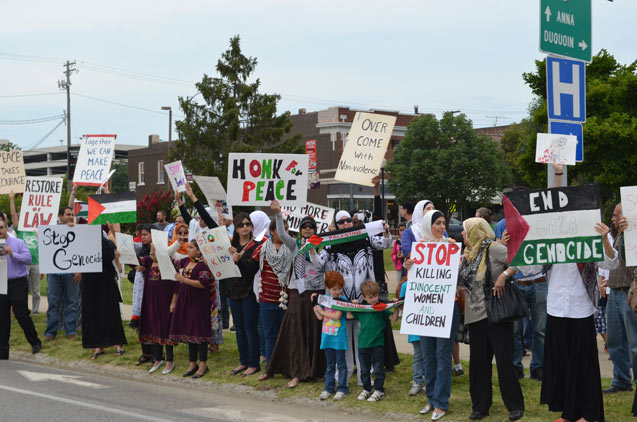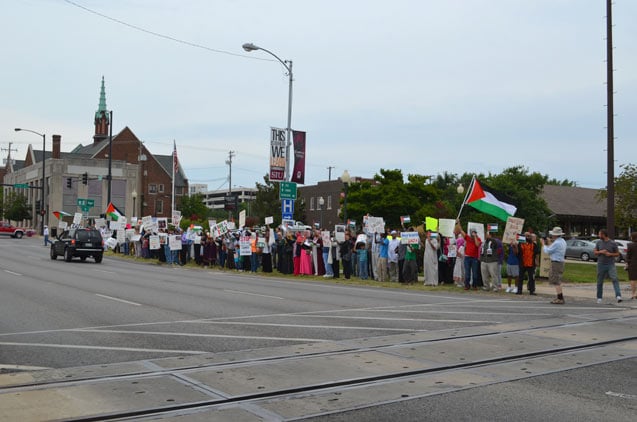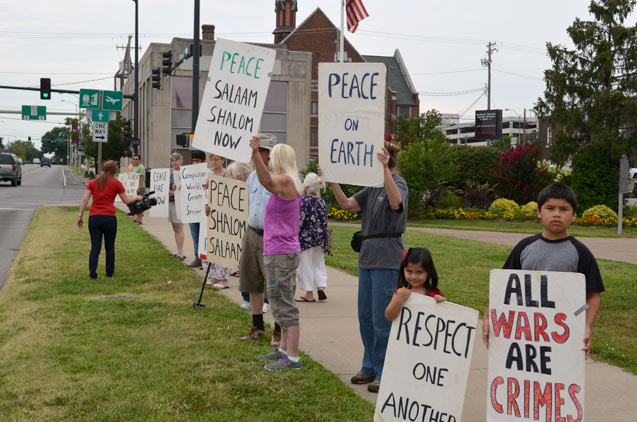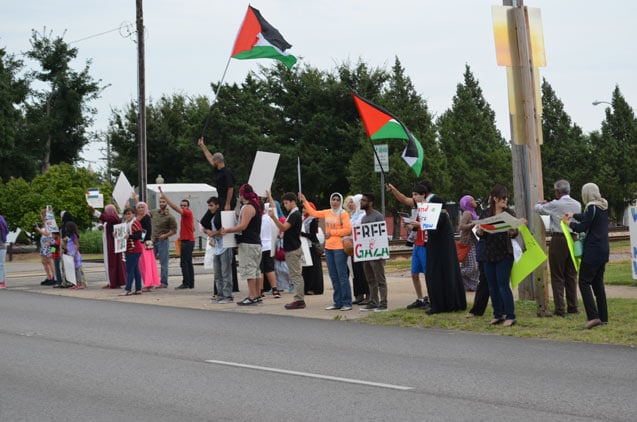
Support justice-driven, accurate and transparent news — make a quick donation to Truthout today!
Two days after the United Nations Human Rights Council adopted a resolution to investigate violations of human rights in the Occupied Palestinian Territory as a result of Israel’s “Operation Protective Edge,” people lined Main Street in Carbondale, Ill., to show solidarity with Gaza and condemn the Israeli assault.
When the Human Rights Council convened an emergency meeting on July 23 and adopted the resolution for an inquiry into potential human rights law violations, the United States was the only nation to cast a negative vote against it.
Abdallah, a young adult from Marion, Ill., held a Palestinian flag and said he hoped the demonstration would “spread awareness in Southern Illinois – not just in Southern Illinois, but all of America,” so that citizens know “in Gaza right now, we have innocent children dying” because of Israel’s military operation, backed by the US.
 (Photo: James Anderson)
(Photo: James Anderson)
In 2013, the US sent Israel $196 million in parts for the sort of planes and helicopters used in the attacks on Gaza, according to an analysis of US Census Bureau export data conducted by Ken Klippenstein and Paul Gottingner. From January to May 2014, the US exported $96 million in similar military parts, they added.
An analysis by Thalif Deen points also to the Foreign-Military-Financing the US provides Israel. Deen noted non-repayable grants from the US to Israel are for the purchase of US-made weapons, and Israel received a 10-year, $30 billion military aid package from the US that runs from 2009 through 2018.
The Israeli assault that started July 8 has killed more than 800 Palestinians, destroyed a school run by the United Nation Relief and Works Agency for Palestine Refugees, andshelled the Al-Aqsa Hospital in Gaza’s middle zone. Demonstrators, near the intersection of Illinois Avenue and Main Street in Carbondale, attempted to draw attention to the ongoing crisis and its history.
 (Photo: James Anderson)
(Photo: James Anderson)
In “Gaza in Crisis,” co-authored with Israeli historian Ilan Pappé, Noam Chomsky documented the history of the protracted crisis, citing examples of past Israeli attacks against Palestinians. Chomsky explained how “in June 1982 the U.S.-backed Israeli invasion of Lebanon opened with the bombing of the Palestinian refugee camps of Sabra and Shatila, later to become famous as the site of the terrible massacres supervised by the IDF [Israeli Defense Forces].” In that 1982 invasion, a bomb hit the Gaza hospital, Chomsky added, and the assault proceeded with “crucial U.S. military and diplomatic support,” including “vetoes of Security Council resolutions seeking to halt the criminal aggression that was undertaken, scarcely concealed, to defend Israel from the threat of peaceful political settlement.”
Abdallah waved a Palestinian flag on Friday, July 25, while people nearby held a banner reading “End the Siege,” as cars headed west on Main Street witnessed the sea of pro-peace advocates calling for a ceasefire and a lifting of the seven-year siege on Gaza. The siege, enforced by Israel, prevents essential goods and medicines from entering while also keeping Palestinians from leaving. Exit through Egypt has also been blocked off since the military coup brought Abdel Fattah el-Sisi to power. As Egyptian president, el-Sisi has been hostile to the Muslim Brotherhood, and Hamas, the organization governing the Gaza Strip, is considered to be the Brotherhood’s political counterpart in the Occupied Territories.
 (Photo: James Anderson)
(Photo: James Anderson)
Ibrahim, Abdallah’s friend, said most media outlets only focus on one side with framing that portrays Palestine poorly. Headlines in major newspapers like, “Hamas Gambled on War as Its Woes Grew in Gaza,” from the New York Times, and “Israel accepts truce plan; Hamas balks,” at the Washington Post elide the realities of the blockade, a form of economic warfare that Palestinians and supporters say renders condition in Gaza unbearable even when bombs are not being dropped.
Abdallah and his friends said that with growing resistance throughout the Occupied Territories, if Israel’s assault and imposed blockade continue, a third intifada is imminent.
“History is repeating itself and the whole world isn’t watching,” said Ahmed Amley, a friend of Abdallah’s.
A terrifying moment. We appeal for your support.
In the last weeks, we have witnessed an authoritarian assault on communities in Minnesota and across the nation.
The need for truthful, grassroots reporting is urgent at this cataclysmic historical moment. Yet, Trump-aligned billionaires and other allies have taken over many legacy media outlets — the culmination of a decades-long campaign to place control of the narrative into the hands of the political right.
We refuse to let Trump’s blatant propaganda machine go unchecked. Untethered to corporate ownership or advertisers, Truthout remains fearless in our reporting and our determination to use journalism as a tool for justice.
But we need your help just to fund our basic expenses. Over 80 percent of Truthout’s funding comes from small individual donations from our community of readers, and over a third of our total budget is supported by recurring monthly donors.
Truthout has launched a fundraiser, and we have a goal to add 182 new monthly donors in the next 24 hours. Whether you can make a small monthly donation or a larger one-time gift, Truthout only works with your support.